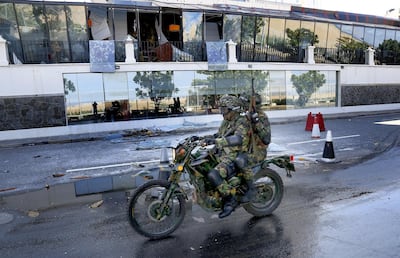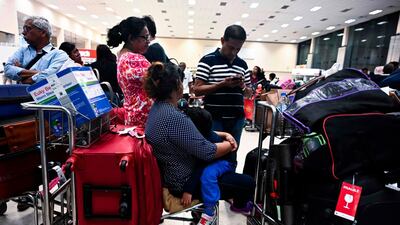Less than 24 hours after the deadliest attack in Sri Lanka’s history, its international airport in Colombo sits under a blanket of darkness punctuated only by the bright glow of the terminal and the lights that line the runways. But Monday was a dark day in Sri Lanka for another reason: terror.
The capital and country that Bandaranaike International serves are under lockdown and the airport is filled at 3am with travellers either trying to leave the country after suicide bombers murdered more than 200 people in eight different locations, or those waiting around for hours for a curfew to be lifted so they can travel on to their destination. A twilight curfew from 6pm to 6am has stifled movement in what is usually one of the most congested cities in the world.
Welcoming airport officers dressed in turquoise uniforms smile on arrival in an attempt to mask the situation from arriving visitors. Soldiers clad in red berets, camouflage slacks and armed with machine guns patrol the terminal floor, an ambulance sits outside the airport for any medical emergency and every person, including Sri Lankan soldiers, are body searched upon entry to the building.
LIVE: Condemnation as death toll soars
A pipe bomb, discovered by a routine military patrol, was defused outside the main terminal just hours earlier. "It was a crude, six-foot pipe bomb that was found by the roadside," an air force spokesman told AFP news agency. "We have removed it and safely defused it at an air force location." There was no indication if the discovery was linked to Sunday’s coordinated attacks.
At the departures gate, tourists are whisked straight into the building by an array of security officers who try to minimise the amount of time they spend land side. Etihad Airlines staff said no additional security measures had been put in place for travel to Sri Lanka, but the island's national carrier warned those leaving the country to arrive four hours before their flight because of increased checks.
A queue waits two-and-a-half-hours for an official airport taxi that can bypass the curfew and the line snakes around the hall. People kick their bags along in frustration while dozens of others have given up waiting until 6am for normality to resume.
A Christian sermon plays on a large LG television set up in the middle of the terminal hall. Instead of the tense atmosphere that is permeating Colombo, Bandaranaike International feels like an airport that has run out of energy. Airport staffers sit asleep behind their counters, from the information desk to the transit hub.
A Sri Lanka tourism stand sits empty, its banner as the number one destination for 2019 by travel guidebook company Lonely Planet stands on its own, likely to be brought down next year, if not sooner. At least twenty-five foreign nationals were killed on Sunday, including at least five Brits, three Danes, two Turks and one Japanese and several Americans.
But as security operations continue across the country amid fears of further attacks, both locals returning home and tourists arriving to experience a new land say they will continue with their journeys.

Dmitri, a 33-year-old from St Petersburg who declines to give his last name, has arrived with two friends and vows to continue with his holiday in Mirissa as they have already paid hard cash.
“We are worried,” he says. “It is bad, but we have to continue. We have paid money. It will be fine.”
Keldrick Wright, a 39-year-old from New Jersey, has arrived to travel and do charity work in Unawatuna, located two hours from Colombo. “I’m going straight to the beach. I’ll be fine. I don’t think it’s going to keep happening day after day.”
Locals working in the tourism industry are returning to tend to their businesses amid a raft of cancellations. But they are optimistic.
Tufail M Saile, the 62-year-old owner of the Colombo hotel CityRest who is arriving back to the city, said he has had “a few” bookings cancelled after the Easter Sunday carnage, some who left negative comments online such as “we are never coming back to Colombo again”.
“But we have some arrivals tomorrow,” he said, positive that business will pick back up quickly.
A tour operator at the airport said: “Everything is fine once the curfew passes”. But other locals say it is not that simple.
Saranga, a 40-year-old employee of the Cinnamon Grand, the first hotel to be targeted on Sunday, points to a picture of the hotel’s swimming pool, detailing which side the bomb went off in the Taprobane restaurant. A suicide bomber detonated the explosives strapped to his back while holding his plate at the breakfast buffet.
“There have been a lot of cancellations, some have arrived and gone straight back, others have said they don’t care and have carried on,” he said. The hotel is partially open and still accepting the bookings made before the attacks. He offers a stay at two other Cinnamon chain hotels in Sri Lanka before giving his view on the perpetrators of an attack never before seen in Sri Lanka, because of its magnitude and breadth.
“We have no words. We don’t know how people can do these things. These people are crazy, they have lost their minds,” he said.
At the transit desk is Shani, a staffer in his 30s, who confirmed the wave of cancellations. “There’s a lot,” he said. “They are scared to come.”
From Negombo, the city north of Colombo where a suicide bomber detonated at St Sebastian’s Church, Shani says he could hear the explosion from his house. He rushed to the scene but was prevented from getting close enough to help. Ambulances and rickshaws carried away the injured, and the roads around the site were closed. He then went to work at 8.30 in the evening, continuing his life as normal.
Across from his booth, stands for the Cinnamon Grand, the Shangri-La and the Kingsbury sit side-by-side, almost a morbid roll call of the horrific violence they collectively experienced on Sunday.
Walking out of the airport to grab a taxi is Najib, an elderly man who has returned from Makkah with his veiled wife after performing Umrah.
In the wake of the attack, the government has remained tight-lipped about the perpetrators and no one has claimed responsibility. But people suspect Muslim extremists. Najib says he is paranoid about talking about the incident with so many Sri Lankan security forces in close proximity. “We have a big problem in our country. We will talk inside, outside is very difficult,” he said.
On the road out of Bandaranaike, palm trees line the boulevard and white buses pick up locals for the journey into the city, as bats flying overhead shriek an eerie morning welcome. The highway into Colombo and its usually clogged streets are on this rare occasion desolate as dawn approaches.
A red sky, a shepherd’s or sailor’s warning, rises over the capital’s Indian Ocean beachfront just minutes before the curfew breaks. And as the country continues to take stock of the Eastern Sunday tragedy that has befallen it, its capital prepares to come alive once again.


